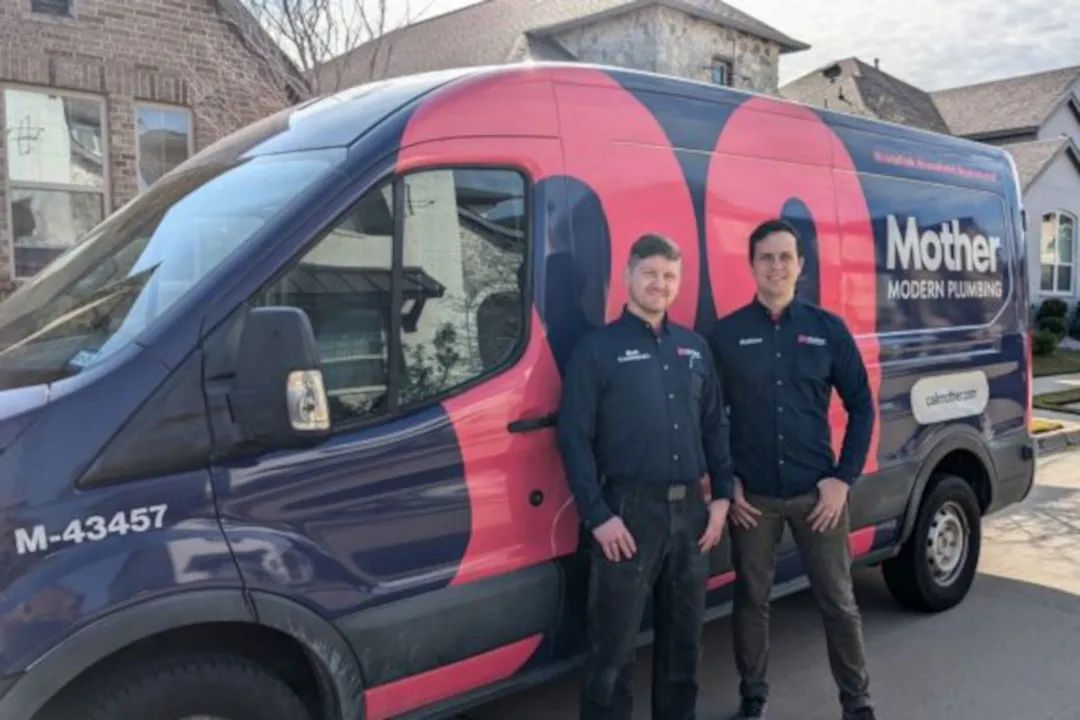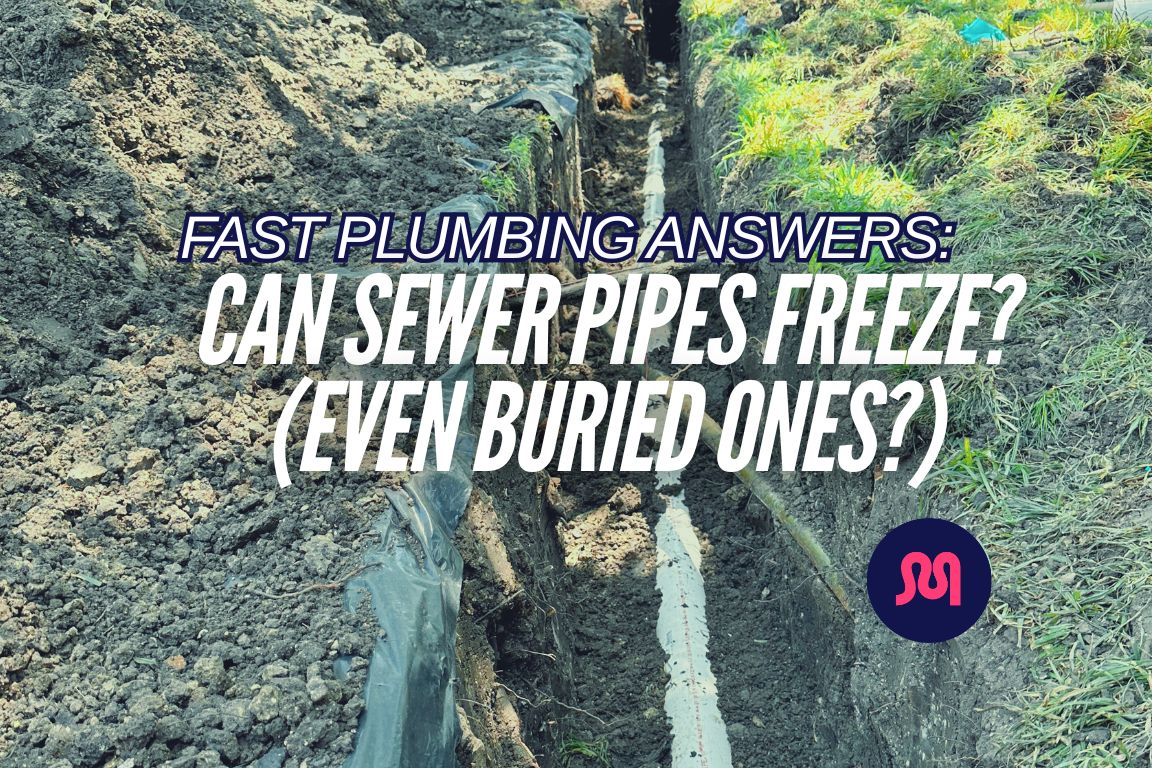Dallas Slab Leak Repair: Your Go-To Guide

table of contents
table of contents
The warning signs are all there: an unexplained spike in your water bill. Low water pressure. Damp spots in your flooring. You have a water leak in your concrete slab foundation.
Dallas homeowners experience slab leaks nearly twice as often as the average American home. At Mother, we identify and repair dozens of foundation leaks every year. We asked our expert plumbers to compile a simple, action-oriented guide to Dallas slab leak repair.
Already stressed out, and need your underground leak fixed fast? Call us 7 days a week — we’ll have an experienced Dallas plumber out to inspect your plumbing ASAP. Then, we’ll provide the best long-term solution for your specific issue.
{{slab-leak-repair="/services/slab-leak-repair"}}
Why Dallas Homes Suffer So Many Slab Leaks

The average American home experiences a concrete slab leak once every 25-30 years. In Dallas, you can expect the same issue every 15 years.
Our unique combination of concrete slab popularity, expansive local clay soil, and extremely hard water makes leaky slabs a serious local problem.
Concrete slab foundations are everywhere in Dallas
Unless you own an old business, your Dallas property sits on a concrete slab. Slab foundations are cheaper and more efficient to install than traditional pier-and-beam foundations.
The upside: you don’t have a flooded basement, because you don’t have a basement.
The downside: your concrete foundation is under constant pressure from our region’s expansive clay soil.
Clay soil is a slab foundation’s worst nightmare
Clay soil is deeply affected by moisture. When it rains, your backyard swells and soggy patches, puddles and heaved landscaping are everywhere. When your soil dries out, it shrinks and cracks.
When the ground is wet, it expands and pushes directly against your slab. Pockets of groundwater form, and eventually, they seep into the porous concrete. As the area dries out, the small crevices remain.
The trouble with mineral scaling
The Dallas-Fort Worth Metroplex has the 6th hardest water in America, thanks to natural limestone formations and bedrock. These minerals are left behind as water evaporates in your yard’s water line. Over time, this hard mineral scaling creates internal abrasion, clogs and pinhole leaks in your pipe.
When those abrasions and leaks form, they attract soil, debris and invasive tree roots looking for food and water.
If those damaged pipe sections are near your home’s foundation, already damaged by clay soil expansion, it’s an easy recipe for slab leak formation.
{{why-does-dallas-have-hard-water="/blogs/why-does-dallas-have-hard-water"}}
The 2 Best Water Line Repair Options for Slab Leaks

Depending on the severity of your slab leak, most Dallas homeowners see the most benefit from 2 options: tunnel repairs and pipe rerouting.
A simple, location-specific cause for your slab leak is often fixable with tunnel repair services. These include a single tree root intrusion or pinhole leak. If your home’s builder installed your water line under your slab, tunneling to perform spot repairs means your plumber won’t break the concrete.
Pipe rerouting is an excellent option for homeowners with persistent and pervasive slab leak issues. If this is your second (or third) slab leak since owning your home, ask your plumber about pipe rerouting.
These aren’t hard and fast rules — the specific cause and severity of your underground leak determines the best course of action.
Tunnel repairs are ideal for isolated slab leaks
A tunnel repair is an effective method for isolated, small leaks when the rest of the pipe is in good condition. It minimizes the disruption to the rest of your water system, and limits (or completely prevents) damage to your home’s foundation.
Access to the affected pipe area is needed for spot repairs. This is either achieved through tunneling (digging in your yard) or a small, precise break in your concrete slab. While a tunnel in your backyard isn’t ideal, it’s certainly better than cracking or breaking your slab.
If you’re lucky enough to spot your slab leak issue early, tunnel repairs save you a ton of money and stress over extensive pipe replacement.
Best use cases for slab leak tunnel repairs:
- A Single, Isolated Pinhole Leak: A spot repair at the precise location in an otherwise healthy pipe is highly effective. Common causes include hard water mineral scaling, a single tree root intrusion, or a localized corrosion spot.
- External Abrasion from a Specific Point: A single point of external wear and tear is best addressed by a spot repair. Sometimes, a pipe rubs against a sharp aggregate in the concrete, a rock, or another pipe. This leads to a localized leak.
Pipe rerouting: a great choice for persistent slab leak repair
Tired of calling plumbers for multiple water line issues under and around your Dallas home’s foundation? Rerouting is the superior option for you.
This service option eliminates costly drilling and digging in and around your concrete slab. Instead, rerouting completely bypasses the problematic section of pipe under the slab by installing new plumbing lines through the attic, walls, or along the exterior.
Rerouting is a long-term solution that eliminates future slab leak risks in that area and avoiding concrete demolition inside your home.
Best use cases for pipe rerouting around slab leaks:
- You Want to Avoid Breaking Up Your Flooring or Foundation (and the Mess That Comes with It): Let's be honest, nobody wants their beautiful tile or hardwood flooring jackhammered up. If the thought of cutting into your concrete slab and dealing with the dust and repairs is a non-starter, rerouting offers a way to get completely new, reliable water lines without ever touching your floor or foundation.
- Inaccessible or Deeply Buried Leaks: Sometimes a leak is directly under a load-bearing wall, a kitchen island, or your main support beams. This makes it incredibly difficult and risky to dig down and fix. Rerouting avoids tearing up these crucial parts of your home by running new pipes through easier-to-access areas like your attic or exterior walls.
- Extensive Tunneling is Expensive: We took over a Fort Worth slab leak repair project where the original bid’s tunneling quote was off by 20+ feet. That drastic increase in tunneling made pipe rerouting the more cost-effective solution.
{{slab-leak-repair="/services/slab-leak-repair"}}
Other Less Common Slab Leak Repair Options
Dealing with a highly specific underground leak caused by a rarely used plumbing fixture? Is your plumber recommending an invasive cut in your concrete slab?
Here’s a look at 2 less common, often more extreme repair options for slab leaks:
Capping the affected line
If your leak is caused by a rarely used fixture, your plumber may suggest capping the affected line from the manifold.
This applies in rare cases where a single plumbing fixture is the root cause of the leak — such as a garage sink.
Saw cutting the slab
When leaks are centrally located beneath the slab, some plumbers suggest saw cutting the concrete to locate the leak from above. It’s a highly invasive repair method that involves difficult, costly remediation and clean up after your repairs are done.
Our expert plumbers advise against saw cutting in almost all cases. It includes flooring costs which are often far more expensive than drywall repair — this cost factor alone makes pipe rerouting a better option.
When Your Slab Leak Requires Extensive Repiping
The last 2 words you want to hear from a plumber are “systemic failure”. This means the existing pipes in and around your foundation are failing due to age, degradation or widespread damage.
Individual spot repairs and patches won’t work anymore. Your water line is shot, and/or the damage has spread to the foundation itself. Home repiping is necessary in 4 scenarios:
- Frequent, Recurring Leaks: If you've had multiple slab leaks in different areas, it's a strong indicator that the entire system is deteriorating. Continuously patching individual leaks becomes a never-ending and expensive cycle.
- Widespread Corrosion or Deterioration: Over time, old copper and galvanized steel become corroded, pitted, or significantly weakened throughout its entire length.
- Pipes Made of Problematic Materials: Homes with original plumbing made from unsafe materials like polybutylene or lead should always be completely replaced. These materials are known for widespread failure and health risks.
- Significant Foundation Movement Causing Multiple Issues: If the ground under your slab is continuously shifting and causing widespread pipe stress and breaks, replacing all pipes with more flexible and durable materials (like PEX) is a comprehensive solution. Weigh the costs of pipe rerouting against a quote for pipe replacement.
It’s pretty terrible, but it’s not the worst case scenario — you’ve identified the problem, and we’ll fix it before it causes structural damage to your home.
Common Dallas FAQs About Slab Leak Repair

Our Dallas plumbing experts answered the 5 most frequently asked questions about residential slab leak repair in our area.
How can you tell if you have a slab leak?
These are the 5 most notable symptoms of a water leak in or around your slab:
- A noticeable increase in your water bill
- Water meter moves after water is turned off
- The sound of running water when no taps are on
- Warm or cold spots on your flooring
- Low water pressure
{{fast-plumbing-answers-warning-signs-of-a-slab-leak="/blogs/fast-plumbing-answers-warning-signs-of-a-slab-leak"}}
How common are slab leaks?
It depends where you live. In most parts of America, slab leaks occur about once every 30 years. Dallas homes average one slab leak roughly every 15 years.
How do you locate a water leak under your slab?
The 2 best ways to locate a water leak under your concrete slab are acoustic leak detection and video camera inspection.
Acoustic detection uses sound to identify leak location. A camera inspection is needed if hydrostatic testing fails, or if acoustic detection is inconclusive.
{{yard-leak-detection-fort-worth="/blogs/yard-leak-detection-fort-worth"}}
How long does it take to fix a slab leak?
Most simple slab leaks are fixed in 2-3 days. If your specific leak requires pulling a city permit, add an extra day to your project timeline.
If you’re rerouting your pipe, plan an extra day for drywall repairs. (Note: Drywall repairs are not included in the cost of plumbing work.)
Are slab leaks covered by homeowner’s insurance?
Homeowner's insurance companies don't love to cover leaks in or near your home's foundation. If you want your slab leak repair covered, you need to follow a precise set of steps to improve your odds of coverage.
Follow these 4 steps in order to increase the chances your slab leak is covered by insurance:
- Immediately contact your insurance provider in the event of a freshwater leak. If you wait, you’ll miss the time window for claim activation.
- Hire a master plumber for 2 key tests: water pressure testing and hydrostatic testing. Insurance agencies value the word of a master plumber over journeymen plumbers.
- Consult a structural engineer before and after plumbing repairs. This proves to your insurance your repairs were done correctly and your foundation’s integrity is restored.
- File all necessary paperwork to your homeowner’s insurance. This includes water pressure and hydrostatic testing results, both structural foundation inspections, and your master plumber’s quote for slab leak repairs.
Lower your insurance before a leak happens! Learn how installing a whole home water shutoff valve saves money on plumbing repairs and premiums.
Call Mother for Fast, Effective Dallas Slab Leak Repair
A leaky slab is extremely dangerous. You’re dealing with more than a busted water pipe — the damage affects your foundation and the structural stability of your house.
Mother Modern Plumbing uses an advanced suite of leak detection services to identify the precise location of your underground leak. We’ll tell you where it is, the extent of the damage, and the best service option for long-term success and security.
Our Dallas plumbing experts have over a century of combined experience with spot repairs, pipe rerouting and partial pipe replacement. If you need an extensive repipe, our Master Plumbers are on hand to provide safe, reliable service.
Need slab leak repair? Don’t hesitate — call Mother 7 days a week or schedule convenient service through our website.
{{slab-leak-repair="/services/slab-leak-repair"}}
Common Q’s about Water Leaks and Repairs
How common are slab leaks?
It depends where you live. In most parts of America, slab leaks occur about once every 30 years. Dallas homes average one slab leak roughly every 15 years.
What is the top warning sign of a slab leak?
If your water meter moves after you turn off the water supply, you likely have a slab leak. Other notable symptoms include an increase in your water bill, warm or cold spots in your flooring, and the sound of running water with no taps on.
What if my slab leak is in an inaccessible location?
For pipe leaks and damage that's extremely hard to reach (i.e. under your slab), pipe rerouting is the best alternative. Your plumber establishes a unique path for your new sewer line, then disconnects the damaged pipe section and seals it at both ends to prevent further leaks.
Are slab leaks covered by homeowner’s insurance?
Homeowner's insurance companies don't love to cover leaks in or near your home's foundation. If you want your slab leak repair covered, you need to follow a precise set of steps to improve your odds of coverage.
Follow these 4 steps in order to increase the chances your slab leak is covered by insurance:
- Immediately contact your insurance provider in the event of a freshwater leak.
- Hire a master plumber for 2 key tests: water pressure testing and hydrostatic testing.
- Consult a structural engineer before and after plumbing repairs.
- File all necessary paperwork to your homeowner’s insurance.




